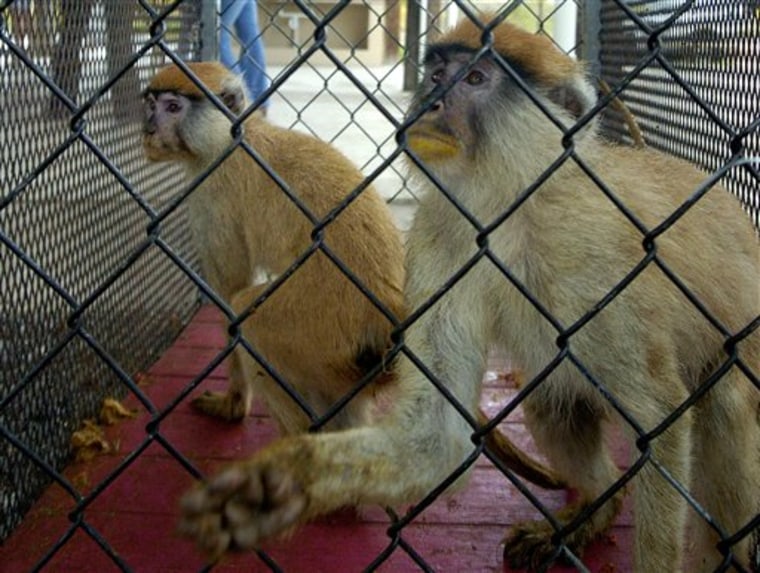Authorities in Puerto Rico are using cages and mangos to try to trap hundreds of marauding monkeys — descendants of escaped research animals — and hope to send them off to sanctuaries or labs, or to kill them.
Since the first eight government traps were set out two weeks ago, the primates have snatched the bait and eluded capture — drawing ridicule from local farmers who blame the monkeys for devastating melon, pepper and pumpkin crops over the last decade.
But Javier Velez Arocho, secretary of the Department of Natural and Environmental Resources, said Wednesday that's part of the plan — that animal control workers have not yet activated the mechanism that will trap the animals.
"We want to lure them for now," Arocho told The Associated Press, saying that he hopes to attract monkeys first and then capture a large group.
"The farmers say it's easy to capture monkeys," he said. "If it's as easy as they say, why hasn't this problem been eradicated?"
The Rhesus monkeys, native to Pakistan India and Nepal, and lightning-quick red monkeys from Central Africa were brought to this Caribbean island 30 years ago to be part of scientific experiments.
Their feral population has since ballooned from about 100 to an estimated 1,000 — prompting growers in the southwestern town of Lajas to switch to raising hay, which the animals do not eat, said Georgie Ferrer, leader of the local farmers' organization.
Ferrer also said the animals threaten bird populations by eating eggs, and some carry the Herpes B virus, which can be fatal to humans. Fears that they could transmit the disease intensified after a farmer bitten two years ago in Lajas died of unknown causes, he said.
The government has earmarked $450,000 to capture the animals and plans to introduce 12 more cages.
Desperate farmers are offering to help.
"It's not that the government's plan isn't going to work, but they have to know the dynamics," Ferrer said. "If you don't know the monkeys' customs, their favorite food or the time at which they drink water, it's going to be real hard to capture them."
Velez said as many of the captured animals as possible will be sent to sanctuaries or research centers, but the government has not completed such arrangements. The rest will be euthanized.
Kelly Overton, director of the New Orleans-based nonprofit People Protecting Animals & Their Habitats, said neither option is a good one for the monkeys.
"When animals are released into the wild, we end up in a situation like this," he said. "Now it's too late. There's not going to be a happy ending to this story."
